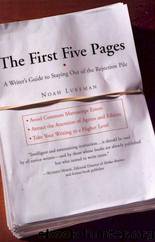The First Five Pages by Noah Lukeman

Author:Noah Lukeman [Lukeman, Noah]
Language: eng
Format: epub, mobi
ISBN: 9780684857435
Publisher: Simon and Schuster
Published: 2000-01-20T08:00:00+00:00
There are not many exercises you can do to learn to fix confusing dialogue—the main task is to identify where and how it is confusing and clear it up. However, there are one or two things you can work on in general:
• Often, trying to spell out dialect is just an easy way out. Try instead to use some of the actual vocabulary (normally spelt) of your subject. This, coupled with mannerisms and tone of voice, will create the desired effect and be much more effective. Study your subject carefully, especially his speech patterns. This time, don't focus on how you might spell out his pronunciations; instead, focus on his choice of words, his ways of expression, his body language. For instance, at the end of the film Sling Blade, the protagonist, when asked why he is holding a weapon, responds to his adversary, "I aim to kill you with it." A lesser writer would have had him say, "I'm gonna kill you with it," lazily choosing the cliche "gonna" in an attempt to capture dialect. This talented writer, with his choice of the unusual "aim," utilized dialect in the highest sense—in the choice of words.
• If you get the complaint that your dialogue is exclusive, next time you write, pretend the reader is completely unaware of the subjects being discussed. Make his under
standing your number-one concern; make him feel at home, as if he were a guest in your house or a stranger from out of town, even at the risk of telling him something he may already know.
Part III
The Bigger Picture
Ninety-nine percent of manuscripts won't even make it to the Bigger Picture, won't even get a chance to be evaluated based upon the criteria laid out in this third section of the book—they will already have been eliminated. If they do make it to this section, from an agent's or editor's perspective, this means that at least the first five pages will have to be read, and read closely, taking into account not just surface technique, but true content. Indeed, some of the following factors (such as pacing) can take up to fifty pages to evaluate in a good manuscript.
On the other hand, if your manuscript has passed an agent or editor's preliminary criteria, and he now must consider bigger factors, he may be more agitated: now he really has to read. He may scrutinize the following factors with greater vengeance in his rush to get you off his pile. He still is not relaxed and still won't take you seriously. He will do so only (to some extent) after he's gotten past the first five pages. So you're not there yet. Now is not the time to relax, to let down your guard; on the contrary, now that you've caught his eye, you have an even greater responsibility to deliver, to put your shoulder to the wheel and make sure your manuscript goes that extra mile.
11
Showing Versus Telling
It seems important to me that beginning writers ponder this—that since 1964, I have never had a book, story or poem rejected that was not later published.
Download
This site does not store any files on its server. We only index and link to content provided by other sites. Please contact the content providers to delete copyright contents if any and email us, we'll remove relevant links or contents immediately.
| Authorship | Bibliographies & Indexes |
| Book Industry |
Asking the Right Questions: A Guide to Critical Thinking by M. Neil Browne & Stuart M. Keeley(5743)
Autoboyography by Christina Lauren(5220)
Eat That Frog! by Brian Tracy(4502)
Dialogue by Robert McKee(4377)
Sticky Fingers by Joe Hagan(4177)
Journeys Out of the Body by Robert Monroe(3605)
Annapurna by Maurice Herzog(3457)
Full Circle by Michael Palin(3434)
Schaum's Quick Guide to Writing Great Short Stories by Margaret Lucke(3366)
Elements of Style 2017 by Richard De A'Morelli(3335)
The Art of Dramatic Writing: Its Basis in the Creative Interpretation of Human Motives by Egri Lajos(3049)
Atlas Obscura by Joshua Foer(2941)
Why I Write by George Orwell(2936)
The Diviners by Libba Bray(2924)
The Fight by Norman Mailer(2918)
In Patagonia by Bruce Chatwin(2909)
The Mental Game of Writing: How to Overcome Obstacles, Stay Creative and Productive, and Free Your Mind for Success by James Scott Bell(2893)
Venice by Jan Morris(2559)
The Elements of Style by William Strunk and E. B. White(2461)
